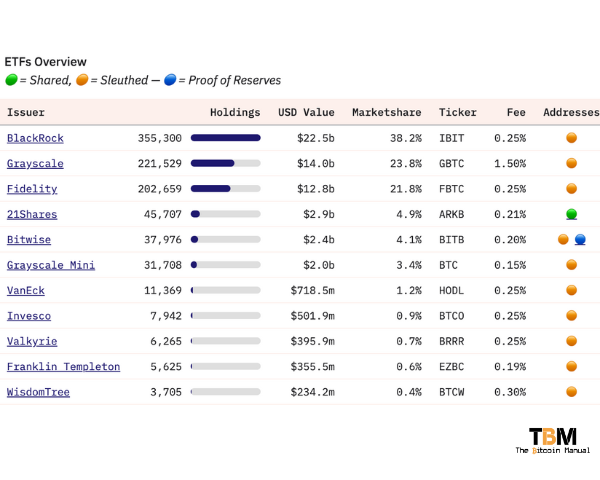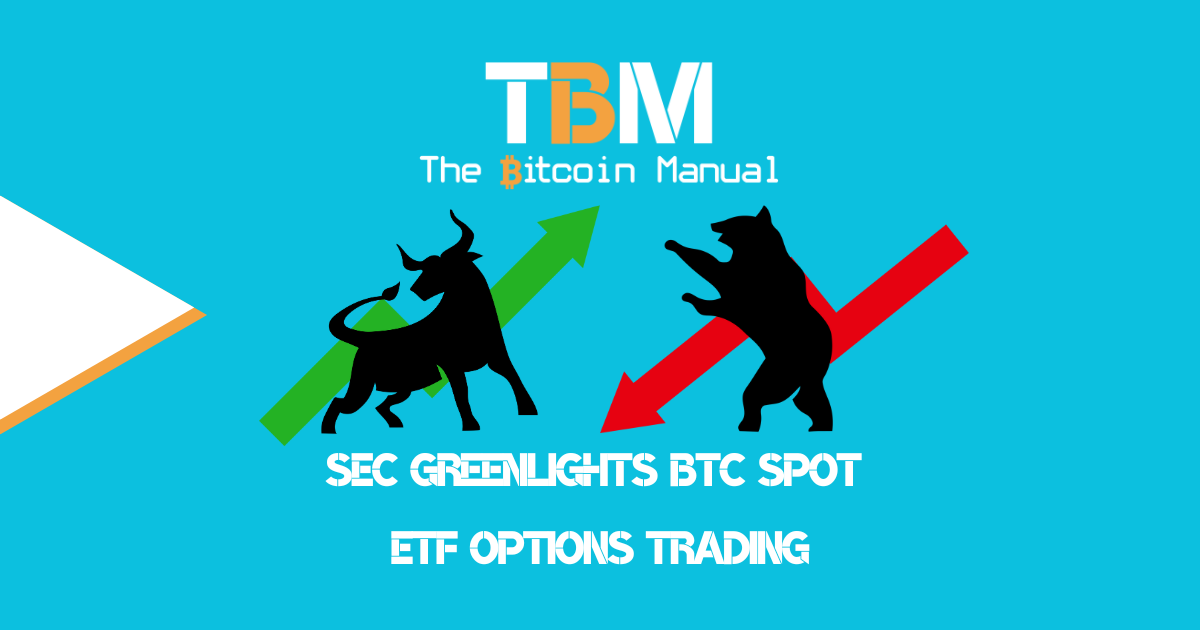In an inevitable development for tradFi Bitcoin enthusiasts and investors, the US Securities and Exchange Commission (SEC) has approved options trading on BlackRock’s Spot Bitcoin ETF, officially known as IBIT.
This decision marks a pivotal moment in the ongoing integration of Bitcoin into traditional financial markets and presents a myriad of implications for traders and investors alike.
Since the launch of the Spot ETF on January 10, 2024, the US paper market for Bitcoin now lays claim to ₿930 000 on-chain, which is 4.71% of the current supply and clears about $1.00B in volume every 24 hours.
While taking a position in Bitcoin and taking advantage of its price appreciation is a long-term strategy, Wall Street isn’t content with low-time preference investing; they are looking to bring forward returns, and you can only do that through trading and speculation.
At the moment, all you can do is play the arb between Bitcoin spot and Bitcoin futures. If options are rolled out, investors will have much more to play with, manage risk, and allocate larger trades.

BlackRock is the crowned King of the Spot ETFs
Before diving into the SEC’s approval implications, let’s clarify what the Spot Bitcoin ETF is. A Spot Bitcoin ETF allows investors to buy shares representing actual Bitcoin ownership rather than futures or derivatives.
This structure offers a straightforward way for traditional investors to gain exposure to Bitcoin without needing to navigate the complexities of owning and storing the Bitcoin directly using an on-chain wallet.
There are currently 11 Bitcoin ETFs available in the US, with BlackRock’s IBIT holding 38.2% of the market. According to the SEC, IBIT ranks 11th among U.S. ETFs by average daily volume (34,825,921 shares) and 18th by average notional value ($1,246,060,738).
As of May 22, 2023, IBIT had approximately 193,956 shareholders.
The approval of options trading on IBIT enables investors to use options contracts to speculate on or hedge their investments in the ETF. This can enhance the trading strategies available to investors and broaden the appeal of Bitcoin investments.
It’s quite the 180; if you consider a few years ago, doom and gloom Boomer Larry Fink was crapping all over Bitcoin, and now his fund is the premier place to go and gamble on it; oh boy, does life come at you fast.
“If you want to hedge hope, Bitcoin is not an instrument for hope,” Fink said. “I look at it as a vehicle in which you’re expressing… that you’re more frightened of the world, you’re more frightened [for] your existence.”
Larry Fink – CEO of BlackRock
Why is This Approval Significant?
Options trading is how investors can speculate on the future direction of the overall stock market or individual securities, like stocks or bonds; it’s a derived product with its own market and can either be physically settled or cash settled.
Options contracts give you the choice—but not the obligation—to buy or sell an underlying asset at a specified price by a specified date.
The claim is that these approved options on the iShares Bitcoin Trust will be physically settled, meaning that when the option is exercised, Bitcoin will be delivered to fulfil the contract.
Now, I am trying to figure out how you can claim that because Bitcoin isn’t physical, what are you actually settling? If you’re talking about on-chain confirmations, I don’t get that either if you’re all faffing around using Coinbase as your custodian, so what physical or on-chain settlement are you on about, mate?
Honestly, am I the one taking crazy pills here?
Enhanced Liquidity
The introduction of options trading can significantly increase liquidity in the market for BlackRock’s ETF. More trading instruments typically attract a wider array of investors, facilitating more robust market participation and tighter bid-ask spreads.
Greater Flexibility for Investors
Options allow traders to employ various strategies—such as hedging against price declines or speculating on price increases. This flexibility can make Bitcoin investments more attractive to risk-averse investors who might have previously been hesitant to enter the crypto space.
Legitimisation of Bitcoin speculation
The SEC’s approval signals a step toward the mainstream acceptance of Bitcoin as a legitimate asset class. With a trusted financial giant like BlackRock leading the charge, more institutional investors may be encouraged to explore Bitcoin investments.
If you want to grab a piece of that volatility but require hedging strategies in the past, you were relegated to dingy off-shore exchanges, so traders would either pass on trading Bitcoin or limit their position sizes.
You don’t want to have to be the one who explains to the board why there’s a hole in the balance sheet. You were trying to trade Bitcoin, and you bought options on some synthetic illiquid market, but it didn’t quite work out as you expected.
Increased Institutional Participation
BlackRock’s involvement and the SEC’s endorsement may lead to more institutional money flowing into the Bitcoin market.
As institutional investment typically comes with more scrutiny and compliance, this can lend additional legitimacy to Bitcoin as an asset that investors should consider as part of their portfolio.
Additionally, some traders could generate an income on their IBIT position by selling options on their position, and we all know fiat bros are besotted with the idea of generating cash flow, so having a product like this could tempt more traders to enter the space.
Impact on Bitcoin Price
Historical trends show that the launch of Bitcoin ETFs tends to positively impact Bitcoin prices because it gobbles up supply and keeps it off the spot market where the prices are set.
As more traders engage with options on the ETF, it may create upward pressure on the underlying asset, leading to potential price appreciation for Bitcoin itself.
When you couple it with the fact that miners can only produce roughly 450 a day, and they’re selling only some of that, there’s only so much spot volume hitting the market to go around.
If more demand flows into an ETF, it’s basically price incentive dumb money that will buy whatever Bitcoin is available for bid until they’ve exhausted the capital, so it tends to push prices upward.
Potential Risks and Considerations
While the approval of options trading on IBIT opens new doors, it’s essential to consider potential risks:
Market Volatility
Increased trading volume and speculative activity can lead to heightened market volatility. Investors must be prepared for rapid price fluctuations that could result from large trades or market sentiment shifts.
Regulatory Scrutiny
As Bitcoin and crypto products gain popularity, they may attract increased regulatory attention. This could lead to changes in trading rules or practices that investors should stay informed about.
Complexity for New Investors
Options trading can be complex and may only be suitable for some investors; ask anyone who has tried to do it on these popular derivate exchanges only to get blown out and left with a zeroed account.
There’s a reason why most options expire worthless, and 90% of traders lose money. Those new to options should take the time to educate themselves on the mechanics and risks involved.
ETFs continue to centralise
While there are 11 ETFs to choose from, you’re really only choosing based on the fees you are willing to pay or which broker has relationships with which provider; in the end, most funds are held with CoinBase.
So any ETF investor has to hope and pray that they are never hacked, rug pull or bugger up a custody setup to the point where coins are unspendable.
If IBIT gets the go-ahead, it only further encourages capital to centralise with CoinBase, their custody provider, and BlackRock, which is already the market leader.
Day by day, the honey pot grows, and the incentive to attack it, too!
Institutional degening approved…almost.
The SEC’s approval of options trading on BlackRock’s Spot Bitcoin ETF, IBIT, is a landmark event that highlights the growing acceptance of Bitcoin in mainstream finance.
While SEC approval is a key step, final approval from the OCC and CFTC is still required before the options can be officially listed. No timeline has been provided for these additional approvals.
By providing additional avenues for trading and investing in Bitcoin, this approval can enhance market liquidity and attract more institutional capital. As the Bitcoin landscape continues to evolve, developments like these will play a crucial role in shaping the future of Bitcoin and its place in global finance.
If these options are approved for trading in the next year, they will come right on time with what we predict will be the next bull run. Should Bitcoin run up in price and create the FOMO manias we’ve seen happen in the past, products like options will only encourage taking more leverage, taking larger positions and, of course, becoming a force multiplier for the price.
Does this mean we could be in for a super cycle?
That I don’t know, but I do know that leverage is also a force multiplier on the way down, and when the music stops and the mania ends, we’re unlikely to see those puts provide much downside protection; I can tell you that much.
Do your own research.
If you want to learn more about the spot ETF, use this article as a starting point. Don’t trust what we say as the final word. Take the time to research other sources, and you can start by checking out the resources below.





Deixar uma resposta